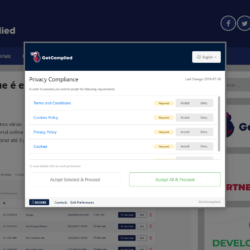What is the impact of GDPR around the world

The GDPR changed how the world interacts with Europe
The GDPR caused a great impact on companies outside the EU that operate largely with EU users. For instance Facebook, Twitter or Apple all updated their privacy terms.
The GDPR law, unlike the Data protection act, covers every country either in the European territory or not. Due to that, some websites outside Europe do not enable European citizens to access their content.
They do that because they fear to be fined for not complying with the GDPR. Outside the EU, countries might have different laws to approach users’ data privacy and non-European corporations don’t feel the need to adjust to European laws. Some companies, for instance, in the USA are closing their content to the EU users, but, we’ll talk about it later.
How will the GDPR affect businesses?
The bigger challenge for companies will be the significant investment they’ll have to make to update every online platform they manage, especially if that platform collects information from their users.
On the one hand, larger companies, like the ones mentioned above, will mostly have no problems adjusting to the new regulations. They have teams to cover every aspect of these laws.
On the other hand, smaller companies require third parties to do so. They have to search for other solutions or stop collecting data and serve a less personalized experience for their users.
The lack of education on this subject is a big problem. It’s relatively new and businesses are not yet educated nor prepared to deal with it. With time there will be solid solutions and specialists to help those in need to comply with the law and provide the rights for the users automatically.
How will GDPR affect digital marketers?
Marketers work with data to learn what users like and see. With the new laws, those activities are compromised.
For marketers to have access to users’ data, they have to get consent explicitly from users. Also if you keep a log of users’ consent, and then they opt out of your database, you have to disregard those users, losing precious information for your study.
With the GDPR, companies must update their databases with the consent of every single user. That has an impact in terms of time and cost for companies.
The marketer will also, in most cases, be responsible for elaborating campaigns that comply with the GDPR. For example, creating email marketing with opt-ins so users know exactly what they are giving consent to.
Blocked Websites on the EU
We gathered some examples of websites that blocked access to EU citizens. Some of them charge money for not collecting users’ personal data, and if you’re not willing to pay and desire to see their content, you have to get your data collected.
Most of them are USA newspapers. For example:
Washington Post

Chicago Tribune

According to The NY Times, major holders of American newspapers like Tronc (owns the LA Times, New York Daily News, Chicago Tribune, Baltimore Sun and others) and Lee Enterprises (which owns 46 locally-focused daily newspapers in 21 states) are blocking, for now, the access from EU citizens.
Some of them didn’t become so defensive and opted for a European version of their website with no data collection or asking for consent.
USA Today and HuffPost are two examples of American newspapers that opted for asking for consent, instead of blocking users.

Curiosity: Not only newspapers are blocking European visitors, for instance, the MotoSport website, also blocked the access to EU citizens, due to the GDPR.
In conclusion
The GDPR brought good measures to make the users’ online experience more secure and to enable them to exercise their rights regarding their data.
Since it’s a new subject and there isn’t yet much information out there, companies tend to misunderstand the true reasons behind them.
Instead of trying to comply and fight for a more transparent online experience for all, some companies become defensive and block everyone that may bring harm.
Perhaps in the future, we can all work together to overcome these difficulties. GetComplied is here to help make that possible!




